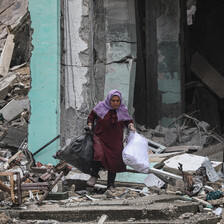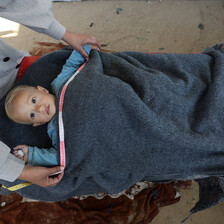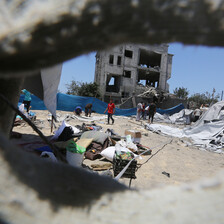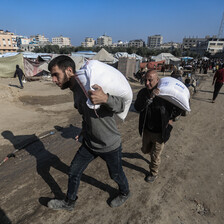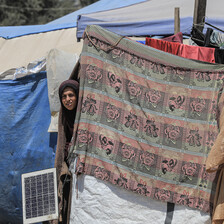The Electronic Intifada 26 December 2024
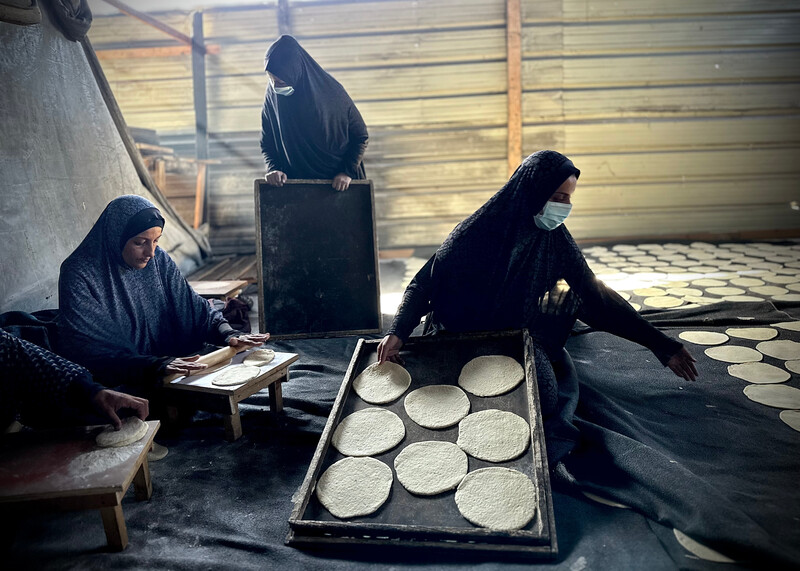
Baking bread for displaced people in al-Mawasi, southern Gaza.
APA imagesWinter in Gaza is unlike any other. Here, it arrives burdened with the pain of the ongoing Israeli genocide, leaving its mark on every corner and every face.
War is not just the destruction we hear about or the bombs we fear; its effects are found in the small details that turn even the simplest rights into distant dreams. The cold wraps itself around us as if it were part of the suffering, adding weight to an already heavy load.
I live alone in a small tent in al-Mawasi, southern Gaza. It was set up after we lost our home in an airstrike.
The tent barely shields me from the wind and rain, yet it has become my entire world. Inside, I have a small sack of flour, which I consider my greatest treasure amid all this hardship.
That flour is my lifeline; I use it to make loaves of bread that barely sustain me, but it’s what keeps me going in this harsh reality.
I was left alone after my mother and sister traveled ahead of me and my father to Egypt following my father’s medical transfer from Gaza to Egypt. My father and I stayed in Gaza until the date of his transfer.
However, Israel invaded the area near the Rafah crossing between Gaza and Egypt in May, forcing its closure.
My mother had left Gaza just before that invasion. And my father’s health quickly deteriorated.
He died in August.
The flour I currently have was not purchased but received as humanitarian aid before the flour shortage began in the southern region of Gaza.
Since I live alone, it was enough to sustain me for a few months. Unfortunately, it is not sufficient to support families during this difficult time.
But the cold shows no mercy, bringing with it a need for more than just food. Hot water, a necessity I had taken for granted, has become a rare luxury.
The cold seeps into my bones, and every time I attempt to use cold water to bathe, it feels like drowning in ice.
Nearby lives Hanaa al-Najjar, who is known to all as Um Ali. Her house is one of the few in this area that survived the Israeli military bombings.
Her modest home seemed like a warm haven compared to my tent, but it wasn’t in much better condition. She has a solar heater that helps provide hot water, but she lacks flour, which has become scarce under the suffocating siege.
One bitterly cold evening, as I sat by my small stove trying to bake some bread, I thought of Um Ali and her four children: three daughters and one son. I also thought of her husband Hassan al-Najjar, who lives with them.
I knew they needed bread as much as I needed hot water for a proper bath. The rain poured down heavily, and the wind howled against the tent as if trying to tear it apart.
I felt an overwhelming urge to do something. I carefully wrapped a few loaves of bread in an old cloth and decided to visit Um Ali.
The short walk from my tent to her house felt endless in the cold and rain. I held the bread close to my chest, protecting it as though it were a priceless treasure.
Each step was heavy as the wind whipped against my face. When I arrived, I knocked softly on her door, and her warm voice called out from inside.
A knock answered
“Who is it?”
“It’s me, your neighbor,” I replied faintly.
She opened the door with her familiar smile, one that carried warmth greater than any solar heater.
“Come in, my dear, it’s freezing outside. What do you have with you?” she asked, gesturing toward the bread in my hands.
Feeling a bit embarrassed, I said, “Bread. But … I was hoping I could get some hot water for a bath. Your heater works, and I don’t have anything to heat water with.”
She smiled kindly and said, “You didn’t have to bring anything. You bring us bread, and we give you water. That’s what neighbors are for.”
I stepped into her home and placed the bread on a table, and she began filling a bucket with warm water from her solar heater.
“Your bread smells wonderful. I didn’t have anything to feed my children today. Bless you,” she said.
Carrying the bucket back to my tent, I felt a warmth I hadn’t experienced in days. It wasn’t just the water; it was the human kindness that we shared despite everything.
I poured the hot water into a small basin and prepared for a bath. For the first time in what seemed like forever, I felt the cold wash away not just from my body but from my spirit.
This exchange of bread and water was more than a simple act of trade; it was a testament to our humanity that refused to be stolen by the Israeli genocide. Despite all the horrors, Um Ali and I stood together, sharing what little we had and giving from our scarcity.
Life, despite all it takes away, sometimes grants us small moments of warmth that remind us to hold on to hope.
That night, as I sat under a worn-out blanket in my tent, I thought of Um Ali and her children. I thought about the bread I had given them and the hot water she had given me.
These small acts of care are the threads keeping us alive.
Winter in Gaza is not just a season these days. It’s yet another test of our patience and resilience.
The war has taken so much from us, but it has failed to destroy the spirit of solidarity that binds us together. We may not have much, but we have each other.
Despite everything, there remains a glimmer of hope, not born of grand promises but of meaningful moments, when we find warmth in our shared humanity. I realized I was not alone, and Um Ali was not just a neighbor but a part of our collective story of survival.
As I recall that night, I feel stronger not because of the hot water or the bread, but because of that deeply human moment that reminded me we are still living with one soul.
No matter how long Gaza’s winters last, no matter how heavy the oppression grows, we hold on to the belief that one day, the sun of freedom will rise just as Um Ali’s solar heater brought warmth into my world during that bitterly cold night.
Lina Hamdona is a writer and pharmacy student from Gaza.
